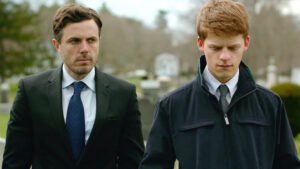
Manchester by the Sea trailer
The movie Manchester by the Sea has been getting rave reviews. I saw it partly because of the reviews, but also because I used to live in the adjacent village of Magnolia. Watching the movie brought back memories of my time at Gordon-Conwell Theological Seminary. The North Shore of Massachusetts is a string of small towns: Salem, Beverly Farms, Beverly, Manchester by the Sea, Magnolia, Gloucester, Annisquam, and Rockport. Gordon-Conwell is situated nearby, further inland, about eight miles away. Because I lived in nearby Magnolia, I was constantly driving through Manchester by the Sea. It was not so much the movie’s storyline, but the background scenery that brought the onrush of memories — the barren winter landscape covered with mounds of snow in the glaring sunlight against the crisp blue sky, the fishing boats floating in the harbor, and the distinctive New England style houses. [Note: the name of the town is “Manchester by the Sea,” not “Manchester.”]
Seeing the austere New England landscape made me reflect on how this Hawai`i-born Asian-American Evangelical began his journey to Orthodoxy. I had chosen Gordon-Conwell because of its reputation for theological conservatism and academic excellence. I also went there because it was situated in the heartland of Puritan New England, the oldest Reformed presence in America. This would put me in a position to meet Evangelicals and Liberals in the United Church of Christ (the present day descendants of the Puritans). In the early 1800s, Congregational missionaries from New England brought the Christian Gospel to Hawai`i. The original missionaries had a high regard for the authority of Scripture but by the late 1900s theological liberalism had become entrenched and dominant in the UCC. My former home church in Hawai`i was one of the few conservative churches in the largely liberal UCC. I was part of the Evangelical renewal movement in the UCC called the Biblical Witness Fellowship (BWF). I went to Gordon-Conwell in hopes of eventually becoming an Evangelical seminary professor to help the BWF bring the liberal UCC back to its biblical roots. However, in a surprising turn of events I became Orthodox!
How did this happen? Despite Gordon-Conwell’s reputation as a bastion for conservative Protestantism, there were already alternative currents of thoughts flowing in the seminary. During the first week at seminary I was walking down the hallway of Main Dorm, to my surprise I saw an icon of Christ on one of the student’s door. Jim was not Orthodox but a member of the Assemblies of God, a Pentecostal group. Seeing this icon would mark the beginning of the many other surprising encounters over the next three years.
Meeting Orthodox Christians
Part of my turn to Orthodoxy can be attributed to the people I met. I was fortunate that Gordon-Conwell offered classes on early Christianity. In that class I met Theo, a bright undergraduate from nearby Gordon College who was Greek Orthodox. Theo introduced me to Fr. Chris Foustokos, the priest at Annunciation Greek Orthodox Church in Newburyport. I later had a long conversation with Fr. Chris during which I grilled him on Orthodox theology and practice. I came away impressed that he did in fact have a personal faith in Christ. I was also relieved to learn that he believed that those who converted to Orthodoxy would not have to undergo Hellenization. In my second year, I sat down for dinner and saw the student sitting across from me make the sign of the Cross. It turned out that Paul had just graduated from Holy Cross Orthodox Seminary and was up at Gordon-Conwell to study youth ministry. A number of us Protestants got to know Paul quite well, and later that semester we accompanied him to the Orthodox Good Friday service in Newburyport.
Did these early contacts persuade me to become Orthodox? Not really. At the time, becoming Orthodox was the farthest thing from my mind. Nonetheless, I was curious about Orthodoxy. These friendly encounters encouraged me to a learn more about Orthodoxy and its ancient Faith. So, while not decisive, these early encounters were indispensable to my becoming Orthodox. Looking back, I would say that what was critical were the positive tone and the absence of a judgmental spirit in the Orthodox Christians I met.
Meeting Orthodox Converts
In my third year, I went to the Greek Orthodox church in Newburyport to hear a presentation by Peter Gillquist, a recent Protestant convert to Orthodoxy. I asked him some hard questions about Orthodoxy and Reformed theology. I admired his honesty, but was frustrated when he humbly admitted that he did not know enough about Reformed theology to answer my questions. This left me on my own to work out the answers about how Orthodoxy and Reformed theology relate to each other. In many ways this conversation was the genesis of the OrthodoxBridge blog. Rather than leave people with similar questions to struggle on their own, I decided I would do the research and present my findings on questions relating to Orthodoxy and Protestantism. The results of my research can be found in the Archives section of this blog.
Did the lack of answers affect my turn to Orthodoxy? Yes, because I needed good reasons for making such a radical change. I shared the Reformed tradition’s concern for right doctrine and the careful study of Scripture. My sense of personal integrity was such that I could not undergo intellectual lobotomy and mindlessly accept Orthodox teachings and practices; I needed good answers, preferably biblical reasons, for becoming Orthodox. The complexity of the issues surrounding the Orthodox veneration of icons, and Protestantism’s core doctrines of sola scriptura and sola fide were such that I needed to do extensive research. The answers are there but require thinking outside the Protestant paradigm and questioning the unspoken assumptions that underlie Protestant theology.
I also got to meet Frank Schaeffer, another recent convert, at the Orthodox church in Newburyport. Where Peter Gillquist was more soft spoken in his presentation of Orthodoxy, Frank was very much in-your-face. When I asked whether I had to give up my Reformed theology to become Orthodox, he answered: “Yes, because it’s theologically off the map.” I was taken aback and a bit affronted by his blunt answer. I know that Frank Schaeffer has caused consternation by some of his recent statements, but I do have some positive memories of his kindness. Once a fellow seminarian was struggling with going to church so I suggested he visit a nearby Orthodox church. He met Frank Schaeffer, who then invited him to his home and cooked him lunch! I was envious when my friend told me this story.
Paper on Icons
During my third year, I wrote a paper on icons and Evangelical spirituality for Prof. Richard Lovelace’s class. For this class I read some of the Orthodox classics like John of Damascus’ Three Treatises on the Divine Images and Theodore the Studite’s On the Holy Images. I also drove down to Holy Cross Greek Orthodox Seminary in Brookline and interviewed Prof. Theodore Stylianopoulos. I was struck by how warm and welcoming Prof. Stylianopoulos was. I was also struck by how restricted access was at the Orthodox seminary library — a big contrast to Gordon-Conwell’s open stacks! One particularly useful book I came across was Antony Ugolnik’s The Illuminating Icon. From this book I learned how images can shape one’s internal life and how Orthodox icons helped preserve Orthodoxy during the decades of oppressive Communist rule in the Soviet Union. This book made me keenly aware of how modern American consumerism is suffused with icons (images). The striking visuals of modern advertising that promote materialism are the spiritual opposite of Orthodox icons. Protestantism’s iconoclasm has made it vulnerable to the iconography of Madison Avenue and Hollywood. From the mass media we are inundated with images of beautiful people with “perfect” bodies who have it all and live “perfectly happy” lives (God removed from the picture). Much of modern advertising speaks to our bodily appetites e.g., food or comfort, or speaks to our inner vanity or selfish desire to do “our own thing.” What is being promoted is a secular worldview where God is allowed a limited role in the modern American lifestyle. In contrast, the otherworldly quality of Orthodox icons points us to the eternal reality that lies beyond the evanescent fads of modernity and our accountability before the judgment seat of Christ.
My paper argued that the aesthetic qualities of icons can be beneficial for personal devotions and that the visual nature of icons can supplement Protestantism’s emphasis on the printed text. This paper falls short of Orthodoxy’s sacramental understanding of icons, but I am not embarrassed by what I wrote because the gap between Protestantism and Orthodoxy is considerable. It takes a while for a Protestant mindset to “get it” with respect to Orthodoxy. This calls for much patience and understanding on the part of Orthodox Christians when they meet Protestants interested in Orthodoxy.
Orthodox Books
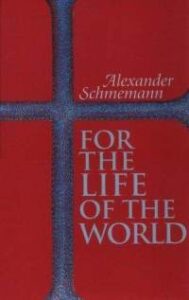 Much of my turn to Orthodoxy at Gordon-Conwell came through reading. Two occasions stand out vividly. During my first year, I went to downtown Boston to make travel arrangements to fly back home. It was a cold and dark winter afternoon, and as I stood in line reading Alexander Schmemann’s For the Life of the World. I found my secular worldview shattered. In the opening chapter, I encountered Orthodoxy’s sacramental understanding of creation and how the common, ordinary meal was a foreshadowing of the Eucharist. What I encountered was not just the idea of sacramental reality, but also Orthodoxy as a gateway into that reality. While Protestantism affirms the reality of heaven, it tends for the most part to project heaven into the distant future or into the afterlife. This way of thinking leaves the present life encased in a secular materialism. I learned that in Orthodoxy ordinary stuff like water, bread, wine, and oil can become vessels of divine grace, ushering us into the kingdom of God here and now.
Much of my turn to Orthodoxy at Gordon-Conwell came through reading. Two occasions stand out vividly. During my first year, I went to downtown Boston to make travel arrangements to fly back home. It was a cold and dark winter afternoon, and as I stood in line reading Alexander Schmemann’s For the Life of the World. I found my secular worldview shattered. In the opening chapter, I encountered Orthodoxy’s sacramental understanding of creation and how the common, ordinary meal was a foreshadowing of the Eucharist. What I encountered was not just the idea of sacramental reality, but also Orthodoxy as a gateway into that reality. While Protestantism affirms the reality of heaven, it tends for the most part to project heaven into the distant future or into the afterlife. This way of thinking leaves the present life encased in a secular materialism. I learned that in Orthodoxy ordinary stuff like water, bread, wine, and oil can become vessels of divine grace, ushering us into the kingdom of God here and now.
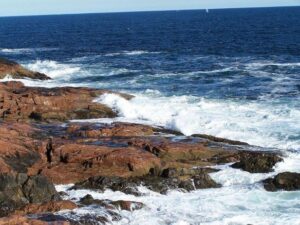
Magnolia rocky shore — Katie Young
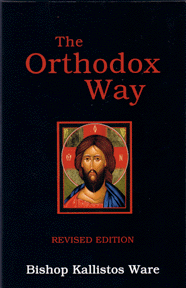 During my third year I would often spend my mornings reading while sitting against a large rock on Magnolia’s rocky shore. One of the books I read was Kallistos Ware’s The Orthodox Way. The chapter “God as Mystery” gave me a glimpse of Orthodoxy’s apophatic approach of understanding God through prayer. During this time I was writing my statement of faith paper for Prof. John Jefferson Davis’ class. This assignment was very much in keeping with Western Christianity’s cataphatic methodology, in which one seeks to learn facts about God and then express this understanding of God through words. From The Orthodox Way I learned how in the apophatic approach, intellectual study and prayer can be integrated to advance our knowing God.
During my third year I would often spend my mornings reading while sitting against a large rock on Magnolia’s rocky shore. One of the books I read was Kallistos Ware’s The Orthodox Way. The chapter “God as Mystery” gave me a glimpse of Orthodoxy’s apophatic approach of understanding God through prayer. During this time I was writing my statement of faith paper for Prof. John Jefferson Davis’ class. This assignment was very much in keeping with Western Christianity’s cataphatic methodology, in which one seeks to learn facts about God and then express this understanding of God through words. From The Orthodox Way I learned how in the apophatic approach, intellectual study and prayer can be integrated to advance our knowing God.
The Liturgy
During my time at Gordon-Conwell, I attended a few Orthodox liturgies. One might expect that I fell head over heels in love with the Divine Liturgy, but that was not the case. The language barrier was so daunting that I saw Greek Orthodox worship as an obscure, intricate ritual. It was frustrating. My experience was like that of a hungry person drawn to a restaurant but standing with his face against the window, looking on longingly, but unable to taste the delicacies within. It was not until I began to attend an all-English Liturgy at a Bulgarian Orthodox parish in Berkeley, California, that my journey to Orthodoxy began in earnest. Attending the Liturgy there week after week, being immersed in the flow of hymns and prayers, helped me to understand what Orthodoxy is about and experience God as Mystery.
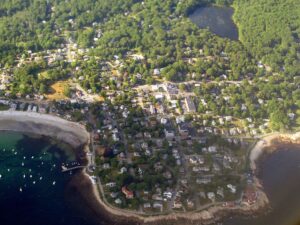
Magnolia village, MA source
Looking Back
My time on Massachusetts’ North Shore was but a small part of my journey to Orthodoxy. By the end of my three years there I was still very much a Protestant in my thinking, but the various personal encounters and books that I read had had an impact on me. They were like little seeds planted in the ground, invisible under the surface but slowly germinating, and in due time emerging as a plant that would one day become a pleasing fruit-bearing tree. An equally good analogy used by my compatriot David Rockett here at the OrthodoxBridge is that these early encounters were like boulders assaulting my medieval castle walls without my noticing the small cracks they were creating in my theological and spiritual foundation! Analogies aside, one take-away here is that journeys to Orthodoxy are rarely instant, dramatic flashes of light in the sky, but more like the gradual light of dawn in which many little things long hidden become noticeable and show their results much later, sometimes after several years.
Robert Arakaki
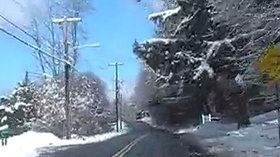
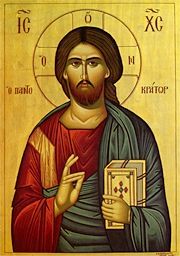
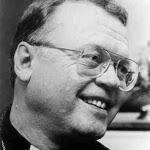
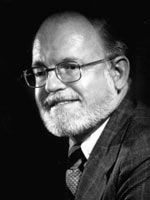
Great article. I have been on my journey now for over a year and a half. I can see how it takes time to understand orthodoxy, especially growing up as a baptist preachers kid. I struggle now with more the family not being onboard than understanding and accepting the Orthodox faith.
I did see Manchester by the Sea. My wife absolutely loved it! Me, I will keep my reviews to myself.
Bill,
Thanks for sharing about your journey to Orthodoxy. You might want to read an article I posted by Fr. Isaiah Gillette “Family Concerns and Converting to Orthodoxy.”
Robert
Aloha, Bill,
My experience is much like yours. It’s been about three years of active participation in Orthodoxy for me, but I am just now beginning to grasp the ethos of the Orthodox Church.
Like yours, my family stands apart in quiet opposition to my desire to convert, a nagging reality that leaves me with less than an ideal choice to make. My friend and mentor, Robert Arakaki, knows my situation and has been patient and helpful during these years in limbo. I think that his years of life in New England helped to prepare him for later association with this transplanted Yankee in Hawai`i.
May God’s grace and mercy be with you and your family.
Chip
I was a Protestant for over fifty years. I was given a book by a seminarian who was getting his Masters degree from a Reformed Protestant Seminary. He was done with the book as it was required reading for one of his classes. I was always under the impression that Orthodoxy was the same as Catholicism and had never heard anything about Orthodoxy in all the years I had been a Protestant. What I learned over the next three years really shocked me. I had never heard about the Ancestral Sin view of the fall over against the Augustinian view held by Rome and the Reformers. This view of the fall where death brings forth sin in our lives really made a lot of sense.
Then you discover that the Orthodox Church does not see Penal Substitutionary Atonement as a proper view of the Atonement. That God is not bound by necessity and is free to show mercy. This is a much different view of God over against the wrathful God of the west who has to punish every sin. The Reformed Faith puts a big emphasis on the sovereignty of God in salvation. This central view of God’s sovereignty is intertwined into other western doctrines to form a view of God that is completely foreign to the God of Orthodoxy. Orthodoxy is more centered on the incarnation of Christ and sees Christ incarnation as a recapitulation of creation. Christ is literally entering into human flesh so that he might destroy the work of Satan death and sin. In Orthodoxy God is saving us from our oppressors. In the west God is saving us from God.
It is very difficult for Protestants to convert to Orthodoxy. Reformed believers have so much emphasis on a rationalistic Scholasticism and this makes it very difficult to understand eastern ways of thinking about God and salvation. Pentecostals seem to convert more easily since they already have a sense of the supernatural and mystery. I still think there is much work for the Orthodoxy Church to do in the area of explaining it’s doctrines to Protestants in the west. There needs to be a much more comprehensive presentation of Orthodoxy to bridge these gaps. I am about three years into my study of Orthodoxy. I am close to converting myself. I am convinced at this point that Orthodoxy is much more in line with the ancient faith delivered to the saints. Sola Scriptura is the big doctrine for Protestants to deal with. If they can’t deal with this doctrine they will never convert.
Randy,
Thank you for sharing your personal story.
You made a good point that the Orthodox church needs to do more to reach out to Protestants and explain their beliefs to Protestants. Please keep in mind that many Orthodox priests have quite full plates. I think what needs to be done is for converts from Protestantism to step up to the plate and tell their priest that they are available to give presentations about their journey from Protestantism to Orthodoxy or to give presentations comparing Protestant beliefs with Orthodox teachings. I know that this will take a lot of preparation or personal courage on the part of the converts but it needs to be done. Likewise, I think that Orthodox priests need to encourage parishioners to share about their journey and to make available the church facilities for these presentations.
God bless you as you continue your journey.
Robert
Thanks robert for a very nice self-disclosure article. It reminded me
that Journeys to Orthodoxy all have their own unique pace and issues… since we are all different creature, with very different backgrounds and baggage. The more I ponder my own Journey to Orthodoxy, the more
I see the hidden hand of God guiding by the Holy Spirit, his sincere but sinful and often foolish disciple…dare to take one more step of faith in the fullness of Christian discipleship. Lord have mercy.
Thanks David!
I have been Russian Orthodox my entire life. In my 20s I started to look around at the other faiths. After going to some catholic and protestant churches (none of my friends were Orthodox and I wanted to blend) I found myself back at my parish St. Trinity Orthodox church in Chicago. Next time your in an Orthodox Church just close your eyes and listen to the music. Take in the beauty of the service, the robes, the icons and incense. It will surpass any intellectual conversations.
Prince Vladimir the Great in search to study religions of his neighboring nations sent his emissaries on this mission. They found it in Constantinople in the Byzantine church of St. Sophia. They reported “We no longer knew whether we were in heaven or on earth”
I liked your analogy of the restaurant and the window. I do have the longing, but there is a barrier that has kept me from entering. I want to be convinced, but I haven’t been and can’t take the lobotomy you mentioned.
Good to see you here Randy. This blog was created for folk just like
you (and me…57 & 34+yrs Ref). Stay here and keep reading. I think
you’ll find much good stuff here tailor make for you.
Thanks, Robert.
My path did not traverse Reformed Theology, but burrowed through American Sectaries of the early 19th C.: Seventh-day Adventists and Latter-day Saints/Mormonism, the first of which I was born and cocooned until graduating from high school, the later as a faithful husband of a devout mother until her repose fifteen years ago. Yes, there are stories, including ‘Buddhist in the Bishopric’!
The catalyst for my response though is the identification of those two books which were pivotal in my baptism into the Church this Theophany (New Calendar), both recommended by Fr. John Bethancourt: ‘The Orthodox Way’ upon my first surreptitious visit to the local parish (Holy Trinity of Santa Fe, AOCA) asking which books to read; the other was mentioned in my first formal visit with him who is become my spiritual father since last Pascha: already reading Schmemann’s ‘Historical Road of Eastern Orthodoxy’ (at Fr. Stephen Freeman’s blog-response suggestion) I devoured it. Also, quite pertinent was Lossky’s ‘The Mystical Theology of the Eastern Church’.
Having long given up on denominational Christianity (from reading Tolstoi’s ‘The Kingdom of God is Within You’) it was enthralling to find the Church, the Bride of Christ, that was founded by His Disciples still extant and thriving among the hogwash of modern self-sufficiency.
Thank-you again for relating pieces of your Journey as I continue my Descent into Orthodoxy.
May it be blessed.
Cyneath Ian,
You have an interesting life story. And, what a wonderful Gaelic name you have! You’ll probably want to read my article “Is Orthodoxy Eastern?” Among the Western saints listed in the article is Saint Kenneth (Cynedd), Hermit Confessor of Wales (d. circa 6th century) who I think shares the same name as you. God bless you on your journey!
Robert
I shall look into your article, but I was aware of at least three 1st millennium Saints, two of the British Isles and one of Denmark, whose contemporary name could be Kenneth, my birth name, after my father. I am given the Prophet, Fore-runner and Baptist John as my patron, and, being of Gaelic descent, I was blessed to be nominated ‘Ian’. I would have dropped the Kenneth (which I have never used, preferring Kenn, a Norse name) except I was aware of the Gaelic spelling and meaning which are acceptable.
One of these days, after being fully submerged in Orthodoxy, I shall prepare my story – I’m still sorting it out.
May it be blessed.
I’m looking forward to reading your story.
Robert